Viewpoint: US must confront its Original Sin to move forward
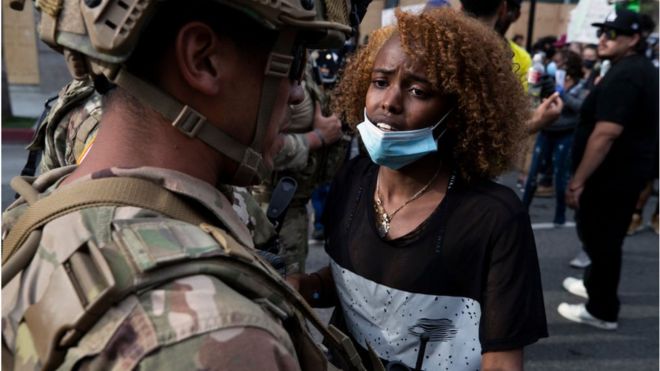 GETTY IMAGES
GETTY IMAGES
Following the death of George Floyd while under arrest, protests have consumed America and onlookers have wondered how one of the most powerful countries in the world could descend into such chaos.
Despite being defined by race, American society does not spend much time analysing the history of our racial divisions, and America prefers to believe in the inevitable progression towards racial equality.
The election of Barack Obama in 2008 fed into this narrative of progress, but Donald Trump's presidential victory in 2016 was seen as a step backwards, coming after a campaign with a slogan that championed America's divisive past as a form of progress.
Floyd's death now appears to be the tipping point for an exhausted, racially divided nation still in the throes of the coronavirus pandemic and the economic cost that followed.
- 'I lost my best friend in a police shooting'
- Timeline of US police killings
- Three facts that help explain anger in the US
Floyd's cries of "I can't breathe" echoed the cries of Eric Garner, who was choked by police on a New York City sidewalk in 2014.
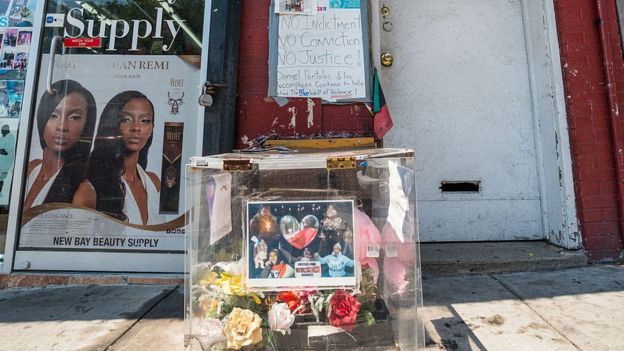 GETTY IMAGES
GETTY IMAGES
Floyd's words reminded Americans of the oppressive past we work to forget regardless of whether it is six years ago, 60 years ago, the 1860s, or 1619 when some of the first slaves arrived in America.
To a large extent, America's neglect of the past and belief in progress has left many Americans unaware of the severity and scope of our racial tensions, and as a result many Americans lack the words to articulate our current turmoil. Recently, I have used the word ethnocide meaning "the destruction of culture while keeping the people" to describe America's past and present racial tensions, and this language also helps articulate the uniqueness of America's race problem.
In 1941, Raphael Lemkin, a Polish Jew and distinguished lawyer, immigrated to the United States as he fled the Nazis. While in America he implored the American government to stop the Nazis from killing his people, and as his words fell on deaf ears, he realized he needed to create a new word to describe the unique horror befalling his people. In 1944, Lemkin coined the words genocide and ethnocide.
Lemkin intended for the words to be interchangeable but over time they diverged. Genocide became the destruction of a people and their culture, and this word radically changed the world for the better. Ethnocide became the destruction of culture while keeping the people, and has been ignored for decades. Recently, ethnocide has been used to describe the plight of indigenous people against colonization, but regarding America, ethnocide also pertains to the transatlantic slave trade and the founding of the nation.
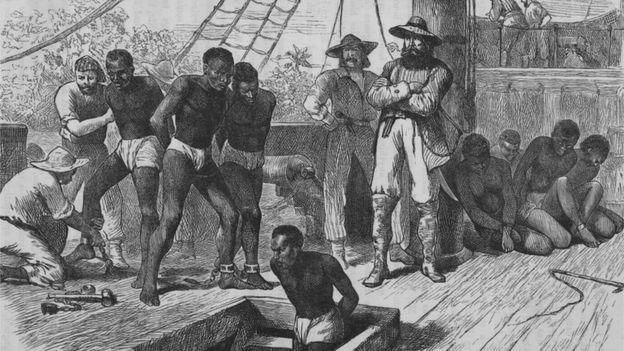 GETTY IMAGES
GETTY IMAGES
From the beginning of the transatlantic slave trade, European colonisers destroyed the culture of African people, but kept their bodies in order to create the chattel slavery system that became the economic and social foundation of the United States. Colonisers prevented Africans from speaking their languages and practising their religions. Tribal and familial bonds were broken, and African people could no longer identify as Igbo, Yoruba, and Malian. Instead de-cultured names such as nigger, negro, coloured, and black were stamped upon African people.
Additionally, Europeans identified themselves as white, and in the United States the one-drop was created to sustain that division. One drop of black or African blood meant that a person could not be white. In America, whiteness became a zero-sum identity that was maintained by systemic racial division. Interracial marriage was still illegal in much of America until the Loving vs Virginia decision in 1967.

Read more from Barrett
- Behind the legacy of America's blackface
- Viewpoint: A 'true horror' story for black Americans
- Viewpoint: Why racial incidents are part of America
- Beyonce’s Homecoming salutes black culture

From colonisation to the formation of the United States, America has created countless laws and policies to sustain the racial division between blacks and whites forged by ethnocide. These American norms, extending to housing, education, employment, healthcare, law enforcement and environmental protections including clean drinking water, have disproportionately harmed African Americans and other communities of colour in order to sustain racial division and white dominance.
George Floyd's murder represents a continuation of the systemic criminalisation and oppression of black life in America that has always been the American norm dating back to Jim Crow, segregation (which means apartheid), and slavery.
When the Confederacy, the collection of American slave-holding states in the South, seceded from the United States, they launched the Civil War to defend the immoral institution of slavery. After losing the Civil War, these states were readmitted back into the United States. To this day, many Americans, and especially America hate groups, still celebrate Confederate soldiers and politicians as heroes, and there are monuments and memorials dedicated to them across America.
Despite the American South losing the Civil War in 1865, American president Andrew Johnson pardoned Confederate soldiers, and soon thereafter Confederate politicians won elected office in the newly-reunited America. The influence of former slave owners and Confederates contributed to erasing the rights that African Americans won in the 1860s including citizenship and the right to vote.
The political campaign to remove African American rights was called the Redeemers movement, and it was led by former slave-owners and Confederates, who wanted to redeem the South by returning it to the norms of chattel slavery. The Redeemers and "Make America Great Again" derive from America's oppressive, ethnocidal school of thought.
The Redeemers were also assisted by American terrorist groups such as the Ku Klux Klan that were made up of former Confederate soldiers. The KKK, and many other white supremacist groups, terrorised and lynched black Americans, and they also prevented them from voting to help ensure that Redeemer candidates won elected office. The terrorists became the government.
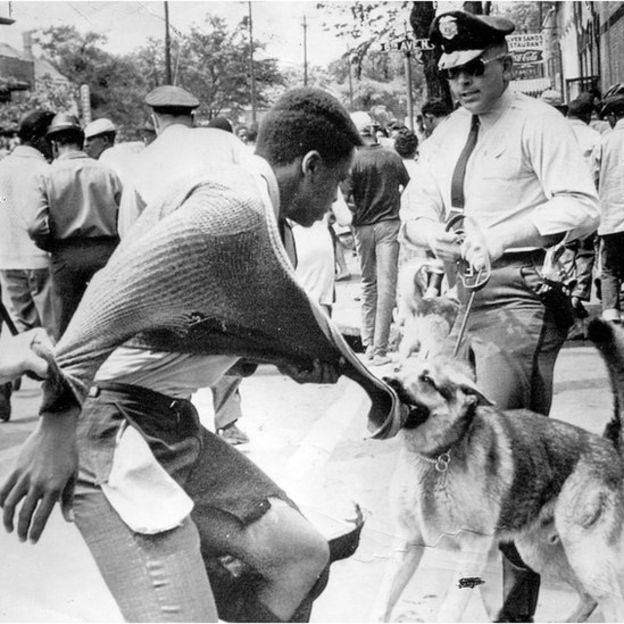 GETTY IMAGES
GETTY IMAGES
By the start of the 20th Century the Redeemers had succeeded in undoing the racial equality progress of the post-Civil War Reconstruction era, and now Jim Crow segregation became the norm of the American South. The Supreme Court's decision in Plessy vs Ferguson made "separate but equal" the new law of the land, and America again became a legal apartheid state.
According to the Equal Justice Initiative's 2017 report Lynching in America, over 4,400 lynchings of African Americans occurred from 1877-1950. That is more than a lynching a week for 74 years.
During Jim Crow, America could not legally deny black people their humanity, but they could deny them the services that are afforded to human beings. Black people were denied education, housing, employment, and were expected to "know their place" as a perpetually subjugated people. Large prisons were erected on former plantations, and black people were arrested for minor crimes and given long prison sentences doing manual labour on the same land their ancestors were forced to work as enslaved people.
As a result of Jim Crow, millions of African Americans fled the neo-slavery and terror of the South during the Great Migration, and racial tensions spread across America as other American cities did not welcome these domestic refugees. This is the same journey as the Underground Railroad, where prior to the Civil War enslaved African Americans escaped the South and sought refuge in Canada and the Northern parts of America.
The civil rights movement of the 1960s effectively ended Jim Crow, and African Americans began reclaiming the rights, specifically voting rights and freedom of movement, they had previously won in the 1860s, but it is a long road to dismantle systemic and legalised racism and segregation.
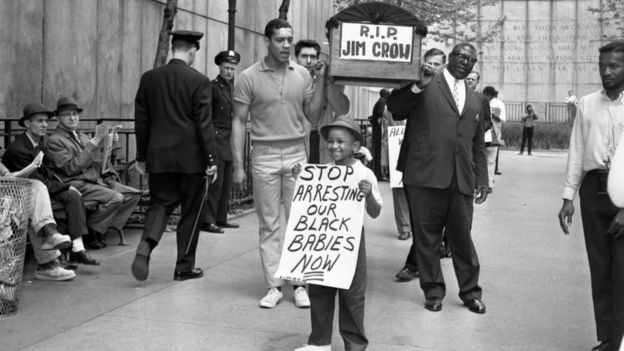 GETTY IMAGES
GETTY IMAGES
Obama's election in 2008 was a monumental event in American society, but it did not magically erase the systemic racism woven into America's social fabric and the 2012 killing of Trayvon Martin, 17, helped launch the Black Lives Matter movement to national attention.
Trayvon was shot and killed by George Zimmerman as he walked home in his own neighbourhood because Zimmerman thought he looked suspicious. Martin was unarmed. Zimmerman pled self-defence and a jury found him not guilty of second-degree murder and manslaughter. Trayvon was one of countless African Americans killed by America's ethnocidal society that sanctions terror from both the government and civilians.
The unjust killing of black people by the police and racist vigilantes remained the norm during Obama's presidency, but now the black community could record and document these crimes on video, and had a president who would defend them. Obama famously said: "If I had a son, he'd look like Trayvon."
The emergence of the Black Lives Matter movement and other protests under Obama occurred because black Americans were confident that the White House would listen to their cries of "I can't breathe" and make American society finally equitable and just. Under Trump those cries have fallen on deaf ears and tensions have escalated.
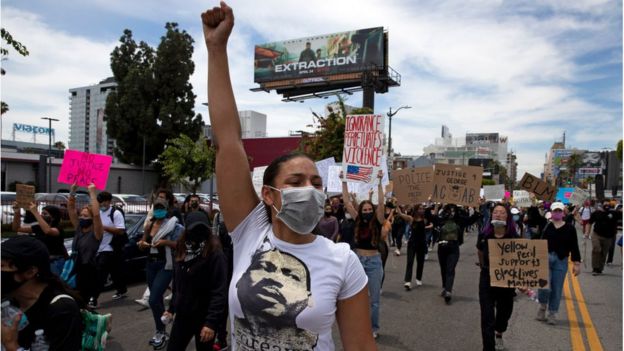 GETTY IMAGES
GETTY IMAGES
America has much work to do to fix our racial tensions because our divisions and inequality are forged in our ethnocidal roots. We need to reform the policing of a nation nearly the size of a continent with over 300 million people, but we also need to make our education, healthcare, and housing systems, and every facet of our democracy more equitable.
Additionally, truth and reconciliation commissions, a national apology, reparations, holding evildoers accountable, and other processes nations have used to heal after a genocide, the linguistic sibling of ethnocide, will help America change course and forge equality and justice.
- Should black Americans get slavery reparations?
- Should the term 'racist' be redefined?
- The awkward questions about slavery from US tourists
Also, America has rarely criminalised white supremacist hate and terror and instead has spent centuries normalising white terrorist groups, celebrating them as heroes, and letting them decide if their actions are evil or not. This is why the Confederacy is still celebrated today. Europe did not allow fascists and Nazis to determine if their actions were good or not, but America has always given this luxury to racist slave-owners and their generational apologists and offspring. This must change.
Rwanda, Germany, and South Africa have reckoned with their troubled past to make a better future, but America has long preferred to ignore the past, and proclaim the inevitability of progress.
America today must define and confront the Original Sin of slavery, ethnocide, and the cultural destruction it has inflicted upon all Americans, past and present. Otherwise we will fail to make a better future, and will continue our regression.
Barrett is a writer, journalist and filmmaker focusing on race, culture and politics
No comments:
Post a Comment